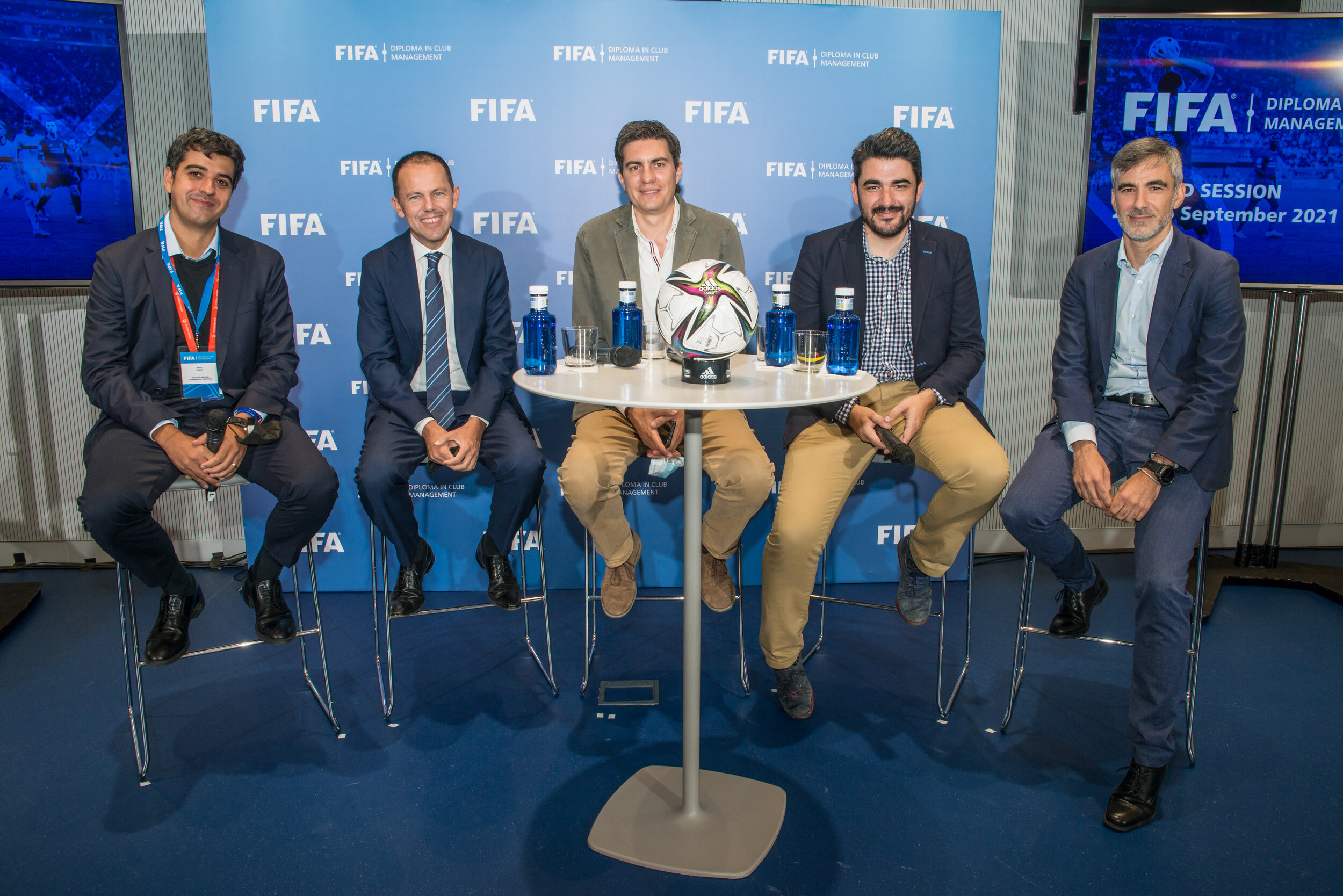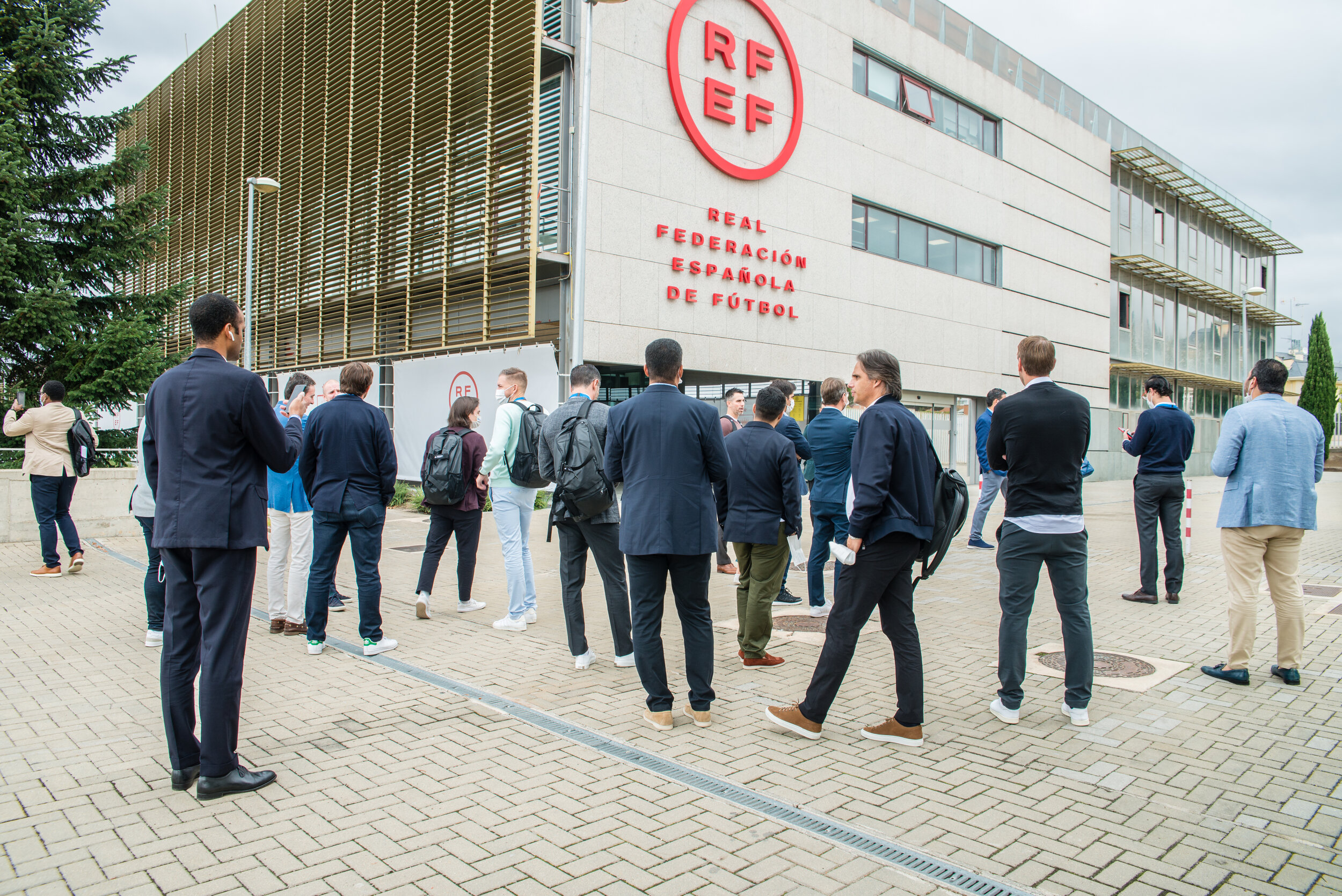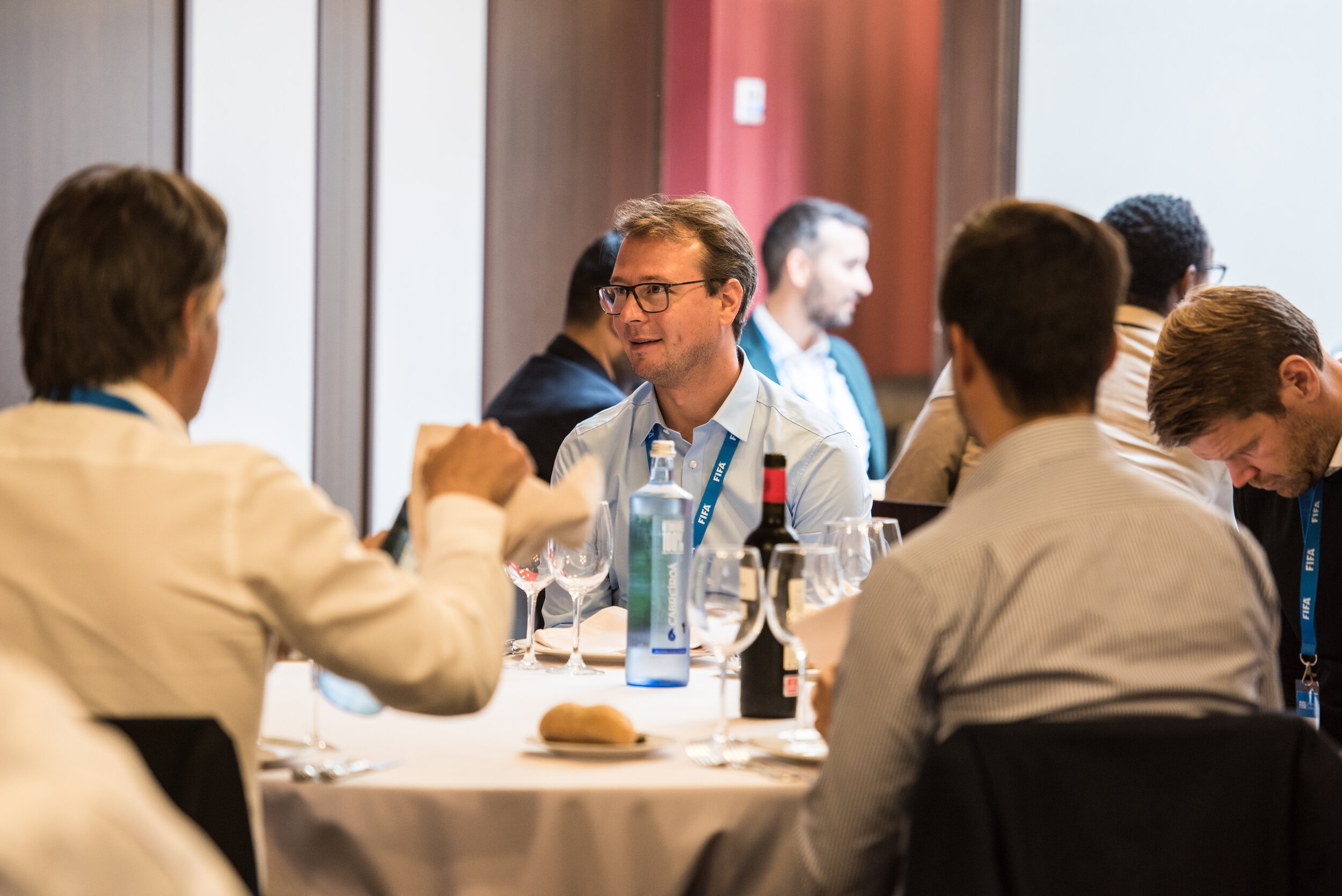
FIFA Diploma in Club Management Madrid session
An event uniting club executives and the game’s leading voices
Madrid was the site of the first in-person session for the FIFA Diploma in Club Management, a new initiative introduced by FIFA in 2021 as part of its vision to make football truly global.
An international cohort of club executives came together in a four day hybrid event as part of the course’s September module.
Course participants heard from a diverse line-up of first-class speakers including legends of the game and leading football executives and visited important institutions and installations in Spain’s capital.
“Inspiring.” This was the word that Philippe Senderos, the former Switzerland defender, used to sum up the experience of attending the Madrid leg of the FIFA Diploma in Club Management in September.
Senderos, now sporting director at Swiss top-flight club Servette FC, was among the participants who gathered in the Spanish capital for the first in-person session of the 2021/22 diploma programme, which began in March and continues until early next year.
It provided an opportunity to hear from leading figures such as Club Atlético de Madrid’s CEO Miguel Ángel Gil, Sevilla FC’s Football General Manager Monchi and former AC Milan, AS Roma, Juventus, Real Madrid CF, England and Russia coach Fabio Capello. Furthermore, there was the chance to visit the headquarters of both the Royal Spanish Football Federation (RFEF) and LaLiga. Due to Covid-19, this was the first gathering of the diploma’s inaugural cohort, which provided an important opportunity to finally connect with fellow participants. The networking possibilities were enhanced by the fact that the first two full days of the session – Wednesday 23 and Thursday 24 September – took place at the Estadio Wanda Metropolitano against the backdrop of the World Football Summit.
Philippe Senderos, Sporting Director, Servette FC
“This diploma gave me the opportunity to learn a lot from different speakers who came and also to learn from the people who are the participants on the course,” Senderos said of the session, which ran from 22-25 September. “This a big part of this course, the networking side. We’re rich in a lot of qualities and capabilities here on this course so it’s amazing to be part of it. You learn a lot from everyone at coffee breaks and lunches. It’s very important to have this feeling with people in networking.”
“What’s interesting is hearing the different ways of how clubs are managed,” he added. “You talk to people in South America and it’s different to people in Europe with the way they manage different situations, so you learn from other people’s experience which is a very big plus. A lot of people taking part have a lot more experience than me and they’ve been in the game in positions of responsibility for longer than me, so they’ve experienced a lot more. For me it’s very inspiring to learn from them and challenging because I need to learn from this and try to adapt it to my environment.”
Wide range of speakers
The FIFA Diploma in Club Management is designed to give knowhow and insights into key areas in the management of football clubs, and this was certainly reflected by the range of speakers who addressed the course participants in Madrid. From Atlético CEO Gil, for example, who spoke on Day 1 at the Metropolitano, the diploma participants heard how the Rojiblancos had successfully created a set of values centred on “being different” from their neighbours Real Madrid. Gil explained too how Atlético had sought to take that brand overseas, through satellite clubs in Mexico, Canada and India. He even attracted two surprise guests to the session in David Villa and Juanfran Torres, members of the Atlético side who won the Spanish league title and reached the UEFA Champions League final in 2013/14.
Miguel Ángel Gil, David Villa, Rafael Alique, Juanfran Torres, Maheta Molango and Ornella Desirée Bellia
There were further insights from the reigning champions of Spain courtesy of a number of club officials. In an illuminating round table, Communications Director Rafael Alique and the club’s business division represented by Iñigo Aznar, René Abril, Alejandro Urriago and Fernando Fariza spoke about topics including the forging of a strong club identity, Atlético’s stadium move, and how to attract new fans through innovative digital coverage. The club’s academy director and deputy director, Emilio Gutiérrez Boullosa and María Teresa Chirivì respectively, later shed light on the Atlético youth system.
Iñigo Aznar, Fernando Fariza, Rafael Alique, Alejandro Urriago and René Abril, Atlético Madrid
María Teresa Chirivì, Emilio Gutiérrez Boullosa, Atlético Madrid
Eduardo Covelo, Academy Director, RC Celta
Another perspective on youth development in the Spanish game came from Eduardo Covelo, the academy director of RC Celta – a club whose canteranos (academy graduates) contributed 71% of their 55 league goals scored in 2020/21. Covelo explained the importance of the personal touch in building a connection between young academy footballers, their families and the club.
A highlight of Day 2 at the Metropolitano was a fascinating and wide-ranging discussion moderated by the Diploma’s Co-director, Ornella Desirée Bellia, which involved Fabio Capello, Monchi and Míchel, and also featured contributions from the former Italy captain and FIFA World Cup winner Fabio Cannavaro, one of the course participants who appeared via Zoom.
Topics covered included the position of the Sporting Director, with Monchi underlining the need for well-defined roles within a club, while Capello cited the importance in his coaching career of having “intelligent people” around him rather than “yes men”. The challenges presented by today’s global game arose too, such as integrating players from diverse countries and cultures, with Míchel recalling the 17 different nationalities in his squad during his time at Olympiacos while Monchi noted: “a dressing room is multi-cultural – food, cultures, religions, customs.” There were reflections too on the impact of social media, the radical change in player preparation brought by advances in sports science, and the increasing need to treat players as individuals – the “social component”, as Monchi put it.
Míchel, Monchi, Fabio Capello, Ornella Desirée Bellia
Pierfilippo Capello, Senior Counsel, Withers Worldwide
To illustrate further the broad selection of subjects, Pierfilippo Capello, a senior counsel in litigation and arbitration at Withers Worldwide, delivered a presentation on digital cards and blockchain technology, addressing the accompanying question of image rights for football players and clubs. And as well as breadth, there was impressive depth to these subjects according to diploma participant Eric Huwer, the Finance Director at Hamburger SV. He explained: “I thought it would be a nice networking event but in the end the content is really deep, the talks are really well-prepared, the programme is really at a high level. It’s really an honour to be part of it.
Eric Huwer, Director of Finance, Hamburger SV
Juan Pablo Ángel, Technical Consultant, LAFC
“It’s so inspiring to get new perspectives, to get to know new problems and especially new solutions,” he continued. “In the football business, we’re all challenged by more or less the same issues but the perspectives, the differences – relating to ownership, to cultural aspects, to entertainment – are really inspiring. I feel humbled being part of this group of such sophisticated people from all over world. We’d known each other over Zoom so meeting in Madrid has been so much fun and it’s really an honour to be here with these guys.”
Juan Pablo Ángel, the former Colombia forward now working as a technical consultant for LAFC, shared his reflections: “The presentations have been focused on themes that interest all of us (and that often you don’t have access to in a course) and there’s been a wide variety in terms of the experts. [The course] covers a series of topics, which is important – not to be an expert in them but to have a certain amount of knowledge so that when you’re connected with a certain organisation, you can have an empathy for all the different areas of a football club.”
Madrid field visits
Beyond the Metropolitano, the diploma cohort had the opportunity of a tour around the Santiago Bernabéu on the third morning of the course, with some of them having already visited the famous home of Real Madrid on an evening outing to watch Los Blancos’ midweek fixture against RCD Mallorca.
There were also the aforementioned visits to the headquarters of both the RFEF and LaLiga. At the former venue on Friday 24th, the group toured the federation’s installations and museum.
The final destination on Day 4 of the session was LaLiga’s HQ, to hear presentations from key figures working for the Spanish league authorities: Carlos del Campo Colás, Deputy Director; Octavi Anoro, Head of LaLiga’s Global Network; José Carlos Franco García, Director of Technology and Data at LaLiga Tech, Olivia Archanco, LaLiga Tech’s Consumer Strategy Director; and Edouard Legendre, the Sponsorship and Strategic Planning Director of Ogilvy.
Carlos del Campo Colás, Ornella Desirée Bellia, Maheta Molango
José Carlos Franco García and Olivia Archanco, LaLiga Tech
Lecture by Octavi Anoro (LaLiga Global Network)
Edouard Legendre, Ogilvy
Ornella Desirée Bellia
Commenting on the Madrid session and the impact of this programme as one of FIFA’s stakeholder-related initiatives, Ornella Desirée Bellia – Head of FIFA Professional Football as well of Co-director of the Diploma – said: “Our President Gianni Infantino’s dream and vision is to have a more competitive and balanced football ecosystem, where in 10 years’ time, at least 50 clubs from all around the world will be able to compete at the highest level. We designed this programme with this dream in mind, and our objective is to give club executives the most innovative tools to be able to compete at the top ‘off the pitch’. This session in Madrid was a fantastic opportunity to meet in person so many great club executives and football minds, learn from each other and enjoy being together after a long period of Zoom meetings.”
A summary of the highlights of this Madrid session of the FIFA Diploma in Club Management can be seen via the video and image gallery below.
Image gallery
















































